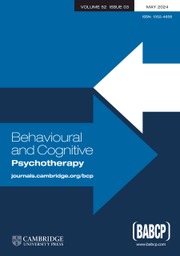- ISSN: 1352-4658 (Print), 1469-1833 (Online)
- Frequency: 4 issues per year
Digital archives
Digital archives are available for this journal, providing instant online access to a repository of high-quality digitised historical content. For more information, please see the Cambridge journals digital archive.
Content preservation
Cambridge University Press publications are deposited in the following digital archives to guarantee long-term digital preservation:
- CLOCKSS (journals)
- Portico (journals and books)
Ownership
This journal is managed and published by Cambridge University Press on behalf of the owners, the British Association for Behavioural & Cognitive Psychotherapies.
Inclusivity and Equality
BCP is keen to contribute to increased inclusivity and progress towards equity within the field of CBT. It therefore welcomes submissions on topics that impact on practitioners and patients from minoritised identities (such as, but not limited to, sexuality, gender, ethnicity). We encourage all authors and reviewers to support the journal’s aims by considering inclusivity of people with minoritised identities within submissions where appropriate. This could for example be discussion of the ethnicities of research participants, reference to specific issues that may be relevant for people from minoritised groups within clinical guidance papers or acknowledgement of gaps in our knowledge.

